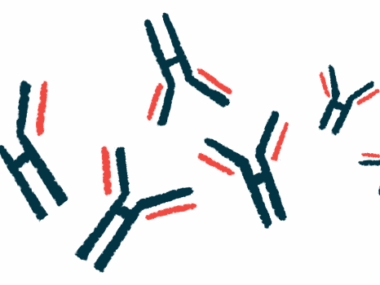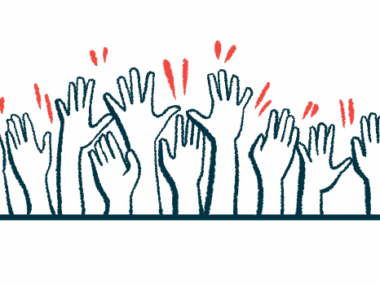Scleroderma Advocacy Can Take a Physical and Emotional Toll
Written by |

Lately, my life has been at a standstill.
For the past 15 years, I’ve found purpose in being a scleroderma advocate, using my voice to share my journey and help others. But I feel like advocacy has started to lose its shine.
Six years after my diagnosis, I decided to be open about my journey with scleroderma. Until that point, I’d remained silent about my struggles, as a part of me was afraid of people’s reactions. Would they be able to connect to my story? Another part of me was angry at the hand God had dealt me.
Sharing my journey
I started out small by creating a Facebook page where I posted updates about my doctors’ appointments and surgeries. I kept the content lighthearted and upbeat. I wanted people to learn from my experiences and not be afraid.
At first, I was terrified of what people might think of me sharing such private, heartbreaking events. At one point, I needed to have a lung biopsy because my lungs weren’t responding to medication very well. I recall mulling over whether to post that information to my page. I worried people would think I was seeking attention or pity, which was far from the truth.
Eventually, my desire to discuss my journey won out against my fear of public opinion. My courage and willingness to share grew, and I started to post the meat and potatoes of my life as a patient. I never looked back.
The continued support of my Facebook community gave me the confidence to take my show on the road. I started to speak at conventions, medical colleges, and patient summits, sharing my journey and my struggles. The rest, as they say, is history.
The weight of advocacy
Lately, something has changed. My efforts to connect with others as Amy the advocate have started to weigh on Amy the sister, daughter, and friend. The more I share with the world, the more people demand of me. I’ve been asked to speak, advise, and participate in so many events. I never want people to think less of me, so I accept wholeheartedly.
After years of this, though, my life no longer feels like my own. Sometimes it seems like I’m living solely to provide support and comfort to others. The amount of energy required to continue my advocacy work has started to cross a line.
The more I think about my life and my 21-year journey with a rare disease, the more confident I am that I’ve found my calling. Being able to help people living with scleroderma fills a hole I had in my life. But where do I draw the line? How do I make my life my own without feeling guilty?
For so long, I’ve tried to be everything for everyone, helping each person that crosses my path and making sure they never feel as alone as I did when I was diagnosed. However, it increasingly seems like I need to take a breather.
Knowing I needed to make a change, I turned to the person I trust and admire most for advice: my dad. His question resonated in my core: “When is it your turn to live for you?”
As I write this, his words run through my head trying to find a home. I have slowly started turning down new projects and am learning to say the word I’ve had such difficulty uttering: “no.” That two-letter word has changed my experience as an advocate and a patient.
Although declining a request to participate or help others is hard for me, it’s important for my mental and physical well-being. Will I ever stop being an advocate? Probably not — it’s my calling. But I’m slowly learning that sometimes, being a little selfish is OK.
Note: Scleroderma News is strictly a news and information website about the disease. It does not provide medical advice, diagnosis, or treatment. This content is not intended to be a substitute for professional medical advice, diagnosis, or treatment. Always seek the advice of your physician or other qualified health provider with any questions you may have regarding a medical condition. Never disregard professional medical advice or delay in seeking it because of something you have read on this website. The opinions expressed in this column are not those of Scleroderma News or its parent company, Bionews, and are intended to spark discussion about issues pertaining to scleroderma.







Denise
I truly admire your honesty. No guilt. You take care of you, do not go backwards emotionally. If that means saying no, that’s ok. I know. I really do. Take care of you.
Joan Krajca-Radcliffe
Bravo!
It’s difficult to recognize and even more difficult to do! You’ve helped so many - you must take time for yourself.
Raymond P Corona
Hi Amy, God Bless you for being you and more importantly, for mustering the energy & effort to advocate for your fellow Sclero sisters and brothers. Do not look at your current situation as being selfish rather you are human like everyone else and you need to set some parameters to reestablish your well-being; otherwise, as you know firsthand, stress can trigger many of our symptoms. Good luck and keep on advocating when you are able.
Pam Hopp
While I was reading your post just now all I could think was "I hope Amy continues with her posts." I find inspiration, knowledge and especially, great fullness in them. I am thankful my disease hasn't reached the levels that you have and are experiencing. I save them all. Please don't stop the posts, Pam
Donna Kajfasz
Hi Amy, I am from Buffalo too! Both myself and my sister have Scleroderma. I had to give up a job I loved because of this disease. It changed me and I was no longer able to deal with people like I use to. I had trouble breathing and couldn't volunteer at a lot of events like I would do in the past. Sometimes we have to take care of ourselves and know our limits. I think it is one of the hardest things about this disease! God bless you on your journey.
Amy Gietzen
Wow Buffalo what a small world! I am sorry to hear you are dealing with scleroderma too. Thank you for your kind words of encouragement and for sharing a piece of your journey with me!
iris montero
I have not been formally diagnosed with scleroderma by an MD. My son, who has this disease ,has insisted that my symptoms are it. I am happy to have this place to find out more about it.
Grace DeLavoye
Hello Amy, I discovered this site about a year ago when my son received his scleroderma diagnosis. Reading your posts helped me so much through a very difficult and confusing time. My son passed away 3 months after being diagnosed. He would have turned 52 years old 5 days later. His decline was rapid and heartbreaking. I am still struggling to understand why it took the doctors almost 4 years to diagnose him and why his decline was so rapid. He had diffuse systemic scleroderma which affected all his organs and especially noticeable on his skin. When I tried to research his symptoms on my own, before he was diagnosed, I never came across any medical references to scleroderma. Your postings would have helped me understand what he was going through at the time but now I can only weep in mental anguish when I imagine the pain and suffering he endured for those 4 years. His family watched him become a skeletal version of his former healthy persona. Thank for being such a powerful advocate for this disease. You are an angel.
Amy Gietzen
My dear Grace, I am terribly sorry for what you and your son had to go through. His story sounds very similar to my first few years as a scleroderma patient. I am touched and honored that my articles help you even just put a smile on your face, That is my life's mission- to educate, support, and raise awareness. Bless you and your son.-A